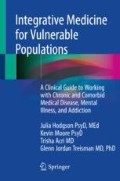Abstract
Individual long-term integrated primary and psychological care are the cornerstones of our integrative medicine approach, especially in the context of treating addiction. While medications are an important tool in the process of recovery, therapy is necessary in order to help the patient to address their addiction as well as the myriad of psychological, relational, and personal issues that threaten their recovery. This chapter introduces the framework from which integrative medicine can intervene in addressing addiction in patients.
Access this chapter
Tax calculation will be finalised at checkout
Purchases are for personal use only
References
Weiss R, Potter J, Fiellin D, Bryne M, Connery H, Dickinson W, et al. Adjunctive counseling during brief and extended buprenorphine-naloxone treatment for prescription opioid dependence: a 2-phase randomized controlled trial. Arch Gen Psychiatry. 2011;68(12):1238–46.
Substance Abuse and Mental Health Services Administration (SAMHSA). Medications for opioid use disorder. Treatment improvement protocol (TIP) series 63, full document, HHS Publication No. (SMA) 18- 5063FULLDOC. Rockville: Substance Abuse and Mental Health Services Administration; 2018.
Grimm JW, Hope BT, Wise RA, Shaham Y. Neuroadaptation. Incubation of cocaine craving after withdrawal. Nature. 2001;412(6843):141–2.
Stewart J. Psychological and neural mechanisms of relapse. Philos Trans R Soc Lond Ser B Biol Sci. 2008;363(1507):3147–58.
Kidorf M, Brooner RK, Peirce J, Gandotra J, Leoutsakos JM. Mobilizing community support in people receiving opioid-agonist treatment: a group approach. J Subst Abuse Treat. 2018;93:1–6.
Kidorf M, Latkin C, Brooner RK. Presence of drug-free family and friends in the personal social networks of people receiving treatment for opioid use disorder. J Subst Abuse Treat. 2016;70:87–92.
Goeders NE. The impact of stress on addiction. Eur Neuropsychopharmacol. 2003;13(6):435–41.
Groblewski PA, Zietz C, Willuhn I, Phillips PE, Chavkin C. Repeated stress exposure causes strain-dependent shifts in the behavioral economics of cocaine in rats. Addict Biol. 2015;20(2):297–301.
Piazza PV, Le Moal M. The role of stress in drug self-administration. Trends Pharmacol Sci. 1998;19(2):67–74.
Miller WR, Rollnick S. Motivational interviewing: preparing people for change. 3rd ed. New York: The Guilford Press; 2012.
Lundahl B, Burke BL. The effectiveness and applicability of motivational interviewing: a practice-friendly review of four meta-analyses. J Clin Psychol. 2009;65(11):1232–45.
VanBuskirk KA, Wetherell JL. Motivational interviewing with primary care populations: a systematic review and meta-analysis. J Behav Med. 2014;37(4):768–80.
Magill M, Gaume J, Apodaca TR, Walthers J, Mastroleo NR, Borsari B, Longabaugh R. The technical hypothesis of motivational interviewing: a meta-analysis of MI’s key causal model. J Consult Clin Psychol. 2014;82(6):973–83.
American Psychiatric Association (APA). Diagnostic and statistical manual of mental disorders. 5th ed. Washington, D.C.: American Psychiatric Association; 2013.
Koola MM, Varghese SP, Fawcett JA. High-dose prazosin for the treatment of post-traumatic stress disorder. Ther Adv Psychopharmacol. 2014;4(1):43–7. https://doi.org/10.1177/2045125313500982.
Dierks MR, Jordan JK, Sheehan AH. Prazosin treatment of nightmares related to posttraumatic stress disorder. Ann Pharmacother. 2007;41(6):1013–7. Epub 2007 May 15.
Author information
Authors and Affiliations
Rights and permissions
Copyright information
© 2020 Springer Nature Switzerland AG
About this chapter
Cite this chapter
Hodgson, J., Moore, K., Acri, T., Treisman, G.J. (2020). Behavioral and Psychological Interventions for Addiction. In: Integrative Medicine for Vulnerable Populations. Springer, Cham. https://doi.org/10.1007/978-3-030-21611-5_7
Download citation
DOI: https://doi.org/10.1007/978-3-030-21611-5_7
Published:
Publisher Name: Springer, Cham
Print ISBN: 978-3-030-21610-8
Online ISBN: 978-3-030-21611-5
eBook Packages: MedicineMedicine (R0)

